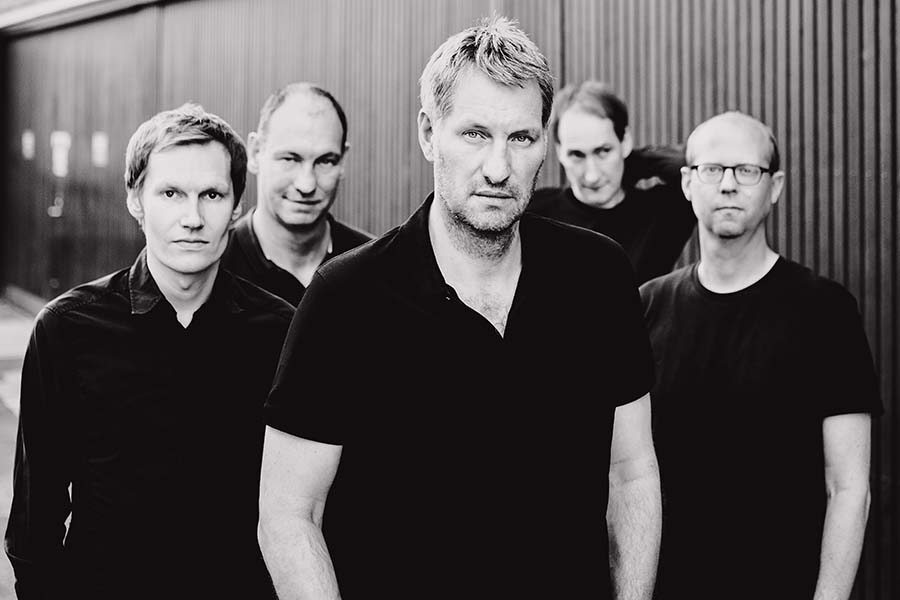During the 1980s and the early part of the 1990s, the Hamburger Schule was a unique music movement based in the northern German city. It was indie. It was punk. It was intellectual. And, most notably, it was in German. But by the late 1990s and into the 2000s, a new generation was taking over. Kettcar is one of those newer bands that stood on the backs of the Hamburger Schule foundation.
The five-piece indie rock band is not about flashy tricks, overly dramatic aggressions, or shock value. It is so much simpler: just play good music.
This month, get to know Kettcar and learn German with music!
Get to Know The Band
Kettcar was founded in Hamburg, Germany, in 2001 by singer and guitar player Marcus Wiebusch, guitarist Erik Langer, bass player Reimer Bustorff, keyboardist Lars Wiebusch, and drummer Frank Tirado-Rosales. But the shared history between the band members goes back much further than its founding.
At first, the connection seems simple. Marcus and Lars are brothers. But there is more. During the 1990s, Marcus and Tirado-Rosales had played music together in a punk band called …But Alive. Then in the decade’s latter half, Marcus and Bustorff played in a ska band called Rantanplan.
Wanting to head in a more laid-back direction with lyrics less driven by politics, the three united forces. Lars and Langer joined Marcus, Tirado-Rosales, and Bustorff to form the band.
In 2010, Tirado-Rosales parted ways with the group and was replaced by Christian Hake.
It is also worth mentioning that just around the time of the founding of Kettcar, Marcus, Bustorff, and Tomte‘s Thees Uhlmann started the independent record label Grand Hotel van Cleef. Creating the label may have had a rather practical reason: you don’t have to find someone else to release your music for you. To date, the label has released all of the band’s recordings.
The Music of Kettcar
At its core, the group has always stayed true to its core goal of more emotional music. On the group’s first two albums – 2002’s Du und wieviel von deinen Freunden and 2005’s Von Spatzen und Tauben, Dächern und Händen – the band are a clear product of the late 90s and early 2000s. The albums are full of sincere ballads. The sound leans more towards indie rock than pop. They are understated and unwilling to show off. Perhaps sounding a bit like a less poppy Goo Goo Dolls.
By their third album, 2008’s Sylt, the band is more alive. The instrumentation is fuller and the band starts adding more piano into the mix, like on the rhythmic “Kein außen mehr.” But their indie rock roots are still there, as “Würde,” a mid-tempo power rock tune, shows.
Over time, the group’s sound has continued to evolve and open up. And 2012’s Zwischen den Runden continues that trend. Amidst all of the very Kettcar-sounding tracks, you find an occasional gem like “Schrilles, buntes Hamburg,” a bouncy and edgy song that comments on Hamburg’s gentrification. Songs like this do not dominate their albums, but when they show up, you savor them.
With 2017’s Ich vs. wir, that attitude continues. The band sounds modern and unafraid to take things head-on, including politics. “Sommer ’89 (Er schnitt Löcher in den Zaun)” draws parallels between the DDR and the European refugee and immigration crisis during the 2015 to 2017 timeframe. Using spoken verses, Kettcar offers an interesting and engaging track.
At the time of this writing, their most recent release is the 2019 EP Der süsse Duft der Widersprüchlichkeit (Wir vs. ich). The momentum that the band has developed over the course of five full-length albums is clear. The five-track release seems more open and honest. “Scheine in den Graben,” for example, takes aim at non-profits and charity events with an all-star cast that includes Bela B of Die Ärzte and Kraftklub‘s Felix Brummer.
Looking for another Ohrwurm to help you learn German? Check out previously featured musicians and bands!
Photo by Andreas Hornoff, courtesy of Grand Hotel van Cleef. This post contains affiliate links.
